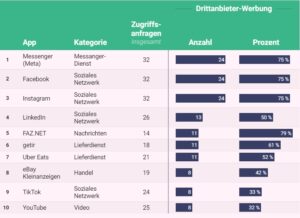
In many smaller companies, it is common for company communication to take place via a private smartphone. It's dangerous enough as it is. But you should also know that many apps evaluate the data for advertising purposes. Here is an analysis list of 100 iOS apps from the Apple App Store and how much data they collect.
Since 2009, the number of smartphone owners has increased tenfold from 6,3 million to 62,6 million in 2021 (Statista.com). For almost every user, mobile applications - apps - have become an essential part of everyday life. More than two million apps are available for download in Apple's App Store alone. More than 90 percent of them are free. This raises the question, how do the developers of these apps make their money? Anyone who uses such apps in the company to keep in touch with customers usually violates not only corporate compliance, but also the GDPR!
No app is really free
A recent study by the Google Play Store has already shown that some of the most popular free apps require access to more than 70 private data points in order to be used. Thanks to GDPR, prior user consent is required, but once access is granted, the apps can also use personal data to their advantage. For example, by selling it to other advertisers.
Specialist HeyData took a look at Apple's App Store and examined more than 120 of the most popular iPhone apps in Germany. They wanted to find out which applications are particularly interested in data in order to:
- sell to third parties and advertisers,
- to use for their own marketing,
- use it to track us on other apps and websites.
An app's request for location access is not automatically negative. For transport and delivery apps, such as Uber or Lieferando, the request to fulfill the service is essential. For other applications, knowledge of the exact location seems irrelevant to the function. That raises questions. Some apps even use tracking to monitor user activity across apps on other apps and websites. Duolingo tops the list: The language learning app makes 19 access requests, of which 68 percent are used for tracking, some of which goes beyond the app.
How apps generate money with data
Businesses also generate revenue from free-to-use apps by using them as a venue for their own marketing activities. The meta apps Messenger, Facebook and Instagram also lead the list in this area. 75 percent of their access requests relate to tracking for internal advertising purposes. The mobility platform Circ uses almost 92 percent of its access requests for its own marketing. Among the dating apps, LOVOO is the app that uses our personal data most often for its own advertising.
Messenger services and chats are among the most used smartphone apps worldwide. Since their inception, the importance of privacy in these apps has been a hot topic. Some services have even made it their mission to offer the highest level of privacy protection and have become known for it. This includes, for example, the app Signal, which does not ask for any personal data. In contrast, other services, such as Meta's messenger and Snapchat, still use private data for tracking and advertising purposes.
Facebook and Instagram gobble up the data
Social networks like Facebook and Instagram are extremely successful at monetizing personal data. Because they collect so much information about users (a total of 54 personal data points each), these platforms have become giant marketing machines. The rich user details that operators of these social networks capture and cleverly market generate billions in revenue. In contrast, Discord, Reddit, and Quora consider themselves social networks. The apps from these providers are far less intrusive when it comes to tracking or selling personal information.
The further evaluation of all areas of use of the apps can also be found online at heyData.
More at heyData.eu
About heyData
heyData is a leading data protection and compliance company. All information relevant to data protection law is made available to our customers via our digital data protection solution, the heyData platform. In addition, our data protection lawyers from heyData are personally available to our customers at all times.

